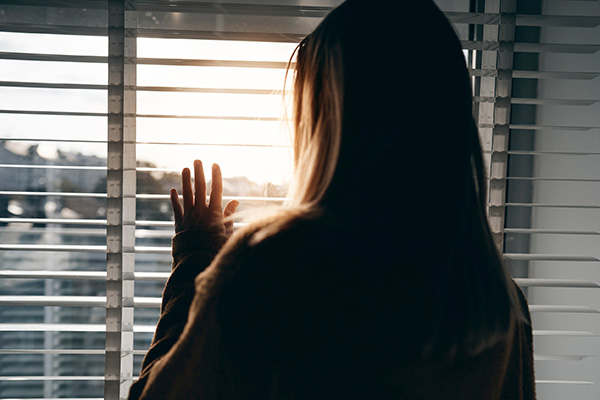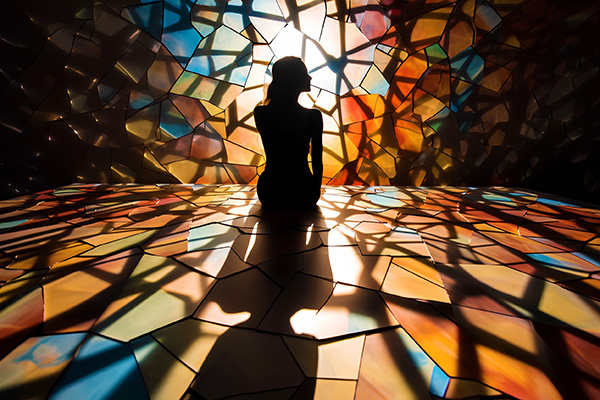inner child
The History And Hidden Blessings Of Halloween

As a child, I remember getting excited about dressing up as a witch on Halloween and enjoying all the treats, like toffee apples and spooky cakes, that my mom used to make.
But one year, my father ruined the holiday for me when he explained his views on the significance of Halloween to me. I was just 10 years old, and it upset me.
Because of his religious beliefs, my father then forbade my siblings and me from celebrating Halloween. This made us feel excluded from our community as we watched other children dress up and enjoy themselves.
As an adult, I learned that it was not the event itself that was the issue, but rather the assumed F.E.A.R. behind it: False Evidence Appearing Real.
Remembering those times recently, I was prompted to take another look into the origin of this holiday tradition and what it truly stands for.
On 31st October each year, the Celtic pagan festival known as Samhain is celebrated, symbolizing the end of the harvest period and the start of the winter season, sometimes referred to as the “darker half” of the annual 12-month cycle.
Long before it became a night of costumes and candy, it was a sacred festival rooted in ancient spiritual tradition. The celebration we now know as Halloween traces its origins to Samhain (pronounced Sow-in), a Gaelic festival that marked the end of the harvest and the beginning of the dark half of the year.
Reclaiming The Voice Of Your Inner Child
 I always sing with my yoga students at the end of class. I used to work in the entertainment industry as a singer, dancer, and actress. Because of that, I feel confident singing in front of people.
I always sing with my yoga students at the end of class. I used to work in the entertainment industry as a singer, dancer, and actress. Because of that, I feel confident singing in front of people.
Growing up, I was always full of joy despite my dysfunctional and rather glum family. Of course, they didn’t appreciate my natural exuberance. They certainly didn’t like that I sang all the time because it represented a lightness of being they had long since given up on.
Like many dysfunctional families, they put me down all the time. They told me that I couldn’t sing and that I sounded awful. But, as with all the other negative, hurtful things they tried to convince me of, I did not believe them.
I kept singing anyway, which irked them. I continued to sing and dance, and I even wrote, produced, directed, and starred in my own musical when I was eleven.
Now I’m not saying I had a good voice as a kid. I really don’t know if I did. But, loving to sing, some voice lessons and lots of joy certainly helped me become a relatively good singer.
One day, after my yoga class, a student came up to me and told me I had a beautiful voice. I thanked her. I often have people compliment my singing voice after class.
The student then told me her family told her she had a bad singing voice when she was a child so she stopped singing. She then mentioned other abuses she received by her cruel family.
A Beginner’s Guide To Holistic Healing
 True healing is about more than just easing lower back pain or calming anxious thoughts. It’s about supporting the “whole you” so you can live in greater balance, joy and peace.
True healing is about more than just easing lower back pain or calming anxious thoughts. It’s about supporting the “whole you” so you can live in greater balance, joy and peace.
It means caring for the body, the heart, the mind, and the soul. While each of these areas can be worked on separately, the deepest transformation happens when they’re all supported together. That’s the essence of holistic healing.
For many people who are new to holistic healing, it can seem complex, mysterious, or even intimidating. Often, there’s curiosity, but also uncertainty about where to begin, especially if they’ve never tried it before.
Some worry they’re not knowledgeable enough, or believe it’s something only meant for people with special spiritual insight or advanced esoteric understanding. Others may wonder if they’ll “do something wrong” or fear they won’t understand what’s happening during a session.
These feelings are completely normal, but they can hold you back from exploring something that could be deeply supportive and life-changing.
The truth is, holistic healing doesn’t have to be complicated or overwhelming. You don’t need to know every technique or understand all the details to benefit from it. An experienced healer will help you find the best route, even if you’ve never walked the path before.
If you’ve never had a holistic healing session, here’s what often happens: You might arrive thinking you need one specific kind of support, but a skilled healer will take time to tune in and see what you truly need most. Sometimes they’ll use the method you requested, and other times they may suggest a different approach, or even combine several techniques, to support you in the best possible way. The aim isn’t just temporary relief; it’s to start you on a healing journey you can continue long after the session ends.
Honoring Yourself In Difficult Family Relationships
 Family dynamics can be tremendously complex for many of us. These relationships are multilayered and deeply ingrained, often playing out across generations.
Family dynamics can be tremendously complex for many of us. These relationships are multilayered and deeply ingrained, often playing out across generations.
Many of my clients seek psychic insight about family matters. After matters of love and romance, and then business or career, family is often the most emotionally charged subject.
In readings, especially with empaths, intuitives, and highly sensitive individuals, I hear countless stories of family pain. Many carry a sense of never belonging, of being misunderstood or scapegoated.
These emotional burdens are often the heaviest that people bear because they are tied to the people they loved first and still love, despite the hurt.
When control or finances are interwoven into the family structure, the complexity of these relationships multiplies.
For many, family represents a love-hate relationship or a deep bond that carries deep wounds. While we cannot choose our family, we do have a say in how we interact with them, how we respond, and whether we continue to engage.
Severing family ties is a significant and often heartbreaking decision that is never taken lightly. By the time someone considers taking this step, the drama or emotional abuse has often been ongoing for decades and is sometimes rooted in a vividly painful childhood.
How To Embrace Your Shadow Self
 Most people tend to shy away from acknowledging their dark or “shadow” side when it comes to spirituality.
Most people tend to shy away from acknowledging their dark or “shadow” side when it comes to spirituality.
In fact, the tendency to avoid the uncomfortable aspects of the self is due in large part to our religious or spiritual background. Throughout history, most traditions have encouraged people to suppress, deny, or transcend their human flaws and shortcomings in favor of higher ideals such as purity, salvation, or enlightenment.
This reluctance to face the shadow within continues to this day, with modern spiritual and metaphysical communities often favoring light, love, and positivity while largely ignoring the messy, difficult, and painful aspects of the human experience.
But by avoiding the shadow within, we deny ourselves the opportunity for a deeper understanding of our soul’s purpose and untapped possibilities for personal and spiritual growth.
According to Carl Jung, the famous Swiss psychiatrist who pioneered the concept of the “shadow” in psychology, “one is not enlightened by imagining figures of light, but by making the darkness conscious.” Enlightenment isn’t about avoiding the shadow. Instead, it’s about facing it and integrating it into our being.
When we face the shadow within, we reclaim parts of ourselves that hold immense power, creativity, and insight. By delving into the deeper truths of our shadow selves, we can unravel the unconscious patterns that dictate our lives, allowing for true healing, transformation, and enlightenment.
Rebuild Your Trust In A Benevolent Universe
 Have you ever watched a child learn to ride a bicycle? There is a certain excitement associated with this rite of passage as youngsters wholeheartedly embrace the possibility of being able to soon ride down the street without help.
Have you ever watched a child learn to ride a bicycle? There is a certain excitement associated with this rite of passage as youngsters wholeheartedly embrace the possibility of being able to soon ride down the street without help.
The first time they get on a bike, they have no prior knowledge or experience to compare it to. Nevertheless, it is usually easy for most children to accept that they will be able to accomplish this task.
Most kids, in their innocence, focus on the joy, freedom and fulfillment of riding a bike rather than worrying about not being able to do it, let alone falling and getting hurt. They also don’t think in terms of good or bad ‘luck’ determining their ultimate success, nor do they imagine that riding a bike is a special gift, talent or privilege reserved only for certain people.
Perhaps this self-belief stems in part from an encouraging parent who has confidently assured the young person that they will indeed be able to achieve this skill. Perhaps the child has seen other children learn to do it and therefore trusts that they can do it, too.
The thing about children is not so much that they blindly or foolishly trust, but simply that, unlike most adults, they have not yet learned to distrust. Being able to trust as an adult is therefore not so much a matter of learning to trust, but of regaining the ability to trust that we once had, until we lost some or all of it through trauma, disappointment, betrayal, or hardship.
